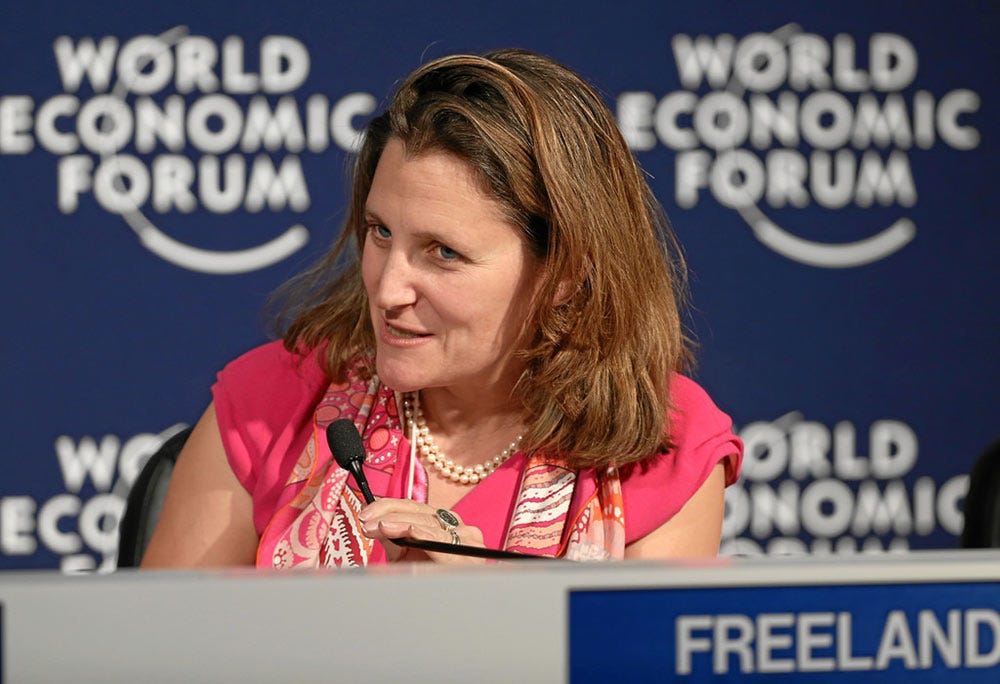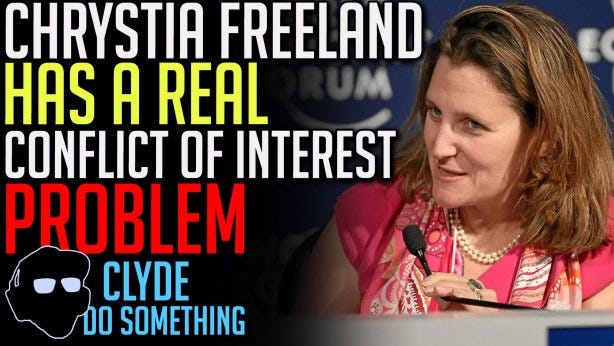Trudeau & Freeland set to Carbon-Tax Canadians $140 billion yearly
by Dan Fournier, Opinion, published Thursday, Dec. 8, 14:30 EST on fournier.substack.com
Chrystia Freeland speaking at Davos (World Economic Forum) in 2016.
Bill C-32 which is currently in its third reading in the House of Commons (as of Dec. 7, 2022) seeks to implement the Canada Growth Fund which was announced in the 2022 federal budget. Under the guise of “climate change” and with the federal government’s commitment to build a net-zero economy by 2050, Chapter two of the budget document indicates that “Canada will need between $125 billion and $140 billion of investment every year over that period.”
Currently, the annual investment in the climate transition sits between $15 billion and $25 billion.
According to a Nov. 3 article by the Financial Post, the fund will invest in industrial emitters, clean-tech companies and other companies across low-carbon supply chains. All this is intended to “stimulate institutional investment in innovation and green projects with risky economic foundations.”
“We are launching the Canada Growth Fund, which will help bring to Canada the billions of dollars in new private investment required to reduce our emissions, grow our economy, and create good jobs at the same time,” stated Finance Minister Chrystia Freeland in a speech on Nov. 28, 2022.
On December 7, during a committee meeting broadcasted from Parliament's upper house, the Senate, Freeland reiterated that the Canada Growth Fund, first introduced in April, will “attract billions of dollars [from foreign investors] in new private capital to reduce our emissions, stimulate our economy, and create good jobs.”
The finance minister did not elaborate on where or from whom those billions of dollars of funds would come from, nor did she offer any specifics on how any of this will actually bear fruit.
Liberal MP Randy Boissonnault, Associate Minister of Finance, also praised that the Canada Growth Fund would “crowd in private capital” so that “we can actually green the economy.” While his Conservative counterpart, Greg McLean pushed back against the notion of easy flowing foreign capital, stating:
“In the time the government has been in power, hundreds of billions of dollars of foreign investment and Canadian investment has left the Canadian economy. The government is now trying to backfill it with more Canadian government money and it is putting a finger in the dike. The government has caused an investment climate that is destroying foreign investment and all investment in Canada.”
Senator Tony Loffreda was also critical about Canada’s lack of innovation and productivity and how the 2022 Budget fails to address these critical growth factors.
“The status quo is no longer acceptable. We need bold ideas that will make Canada the most attractive place to invest. I concede the challenges before us are huge — even overwhelming — but not addressing them and finding tailored solutions is a risk we can’t afford,” Loffreda concluded.
Legislation to make life “more affordable”
In a Nov. 4, 2022 news release, the Department of Finance of Canada, under the leadership of Chrystia Freeland, Minister of Finance and Deputy Prime Minister, stated that Bill C-32 will “make life more affordable and build an economy that works for everyone.”
While some measures such as cutting taxes for Canada’s growing small businesses from 15 percent to 9 percent can improve small business owners’ bottom lines, and offering incentives for first-time home buyers can help make life more affordable for Canadians, the news brief once again fails to mention how the Canada Growth Fund will either attract foreign investment or increase standards of living.
If anything, the Canada Growth Fund, in reality, acts as its own antithesis to what it is purportedly devised to do.
Firstly, its name is rather deceptive, for it conveys that it will “grow funds”, presumably by attracting foreign investment.
In fact, it is cleverly and deceptively disguised as a carbon-taxing mechanism to be foisted upon unsuspecting Canadians.
Trudeau’s Liberal federal government has already overly committed itself by imposing a hefty burden on Canadian individuals and businesses amid unrealistic 2030 and net-zero 2050 targets under the highly questionable “Climate Change” thesis that many view as an elaborate swindle or grand deception to grandiosely tax the masses.
The Canada “Growth” Fund clearly states that we need to “invest” $15 billion annually which will swell to a mammoth $140 billion per year leading up to 2050.
With a population of 38 million, such a carbon-tax burden would amount to $3,684 per Canadian per year, or around $11,000 to $14,700 or more per household.
And since the burden is supposed to be levied each year until 2050, or 27 years, that would end up costing the current and next generation of Canadians anywhere between 3.3 to 3.7 trillion dollars, or close to $100,000 per citizen.
It remains a complete mystery how such financial burdens imposed on Canadians equates to making their lives “more affordable.”
Are our Liberal politicians serving Canadians’ or supranational organizations’ interests?
In the last few years, both Prime Minister Justin Trudeau and Finance Minister Chrystia Freeland have been criticised for kowtowing to the interests of the likes of the World Economic Forum (WEF), the United Nations and its Climate Change conferences such as COP27 recently held in Egypt.
Justin Trudeau has been highly praised by the WEF’s leader Klaus Schwab, who openly bragged about “penetrating the [Canadian and other] government Cabinets.
Chrystia Freeland, a Rhodes Scholar and 2022 Bilderberg attendee, currently sits on the WEF’s Board of Trustees.
It is no secret that the WEF works hand-in-hand with the United Nations to help realise their 2030 Sustainable Development goals, or as Whitney Webb and Iain Davis would put it, their Sustainable Debt Slavery goals.
Irrespective of which side of the fence one sits on about the authenticity of climate change and the selective sciences to back them, the fact remains that it is nonetheless massively used to tax the masses around the globe.
Canadians, being the mindful and generous souls that we are known for, are more than willing to oblige in supporting and even propagating this costly enterprise.
And it certainly appears that in the years to come, Canadians will foot its massive carbon bill unless they start pushing back against these politicians who don’t have our interests at heart but are rather intent on usurping our national sovereignty to supranational entities.
Notes:
This article is also published as a news article in The Counter Signal.
And it was also commented upon by YouTuber Clyde do Something in his Dec. 13 broadcast entitled Chrystia Freeland Has a Real Conflict of Interest Problem - $140B Carbon Tax Bill To Come.
Disclaimer:
See the author’s About page for full disclaimer.









These fools just mortgaged our future.
None of this will translate into green anything other than red faces.
Canadians need to wake up and understand they're being sold down the river. Next election the Liberals need to be booted out.
Here is bill c-32:
https://www.parl.ca/DocumentViewer/en/44-1/bill/C-32/third-reading
It is clearly a significant piece of legislation, and it does talk about changes to both the Greenhouse Gas Pollution Pricing Act and income tax. There are also provisions to allow the government to force property owners to answer questions in writing and various other items - and provisions on many other subjects.
I have not read this closely. That said - I do NOT see references in this bill to the amounts described in this article of $140 billion per year. Could I request the author reference those portions of the bill which tie to the amounts in question for the benefit of readers?
Thank you.